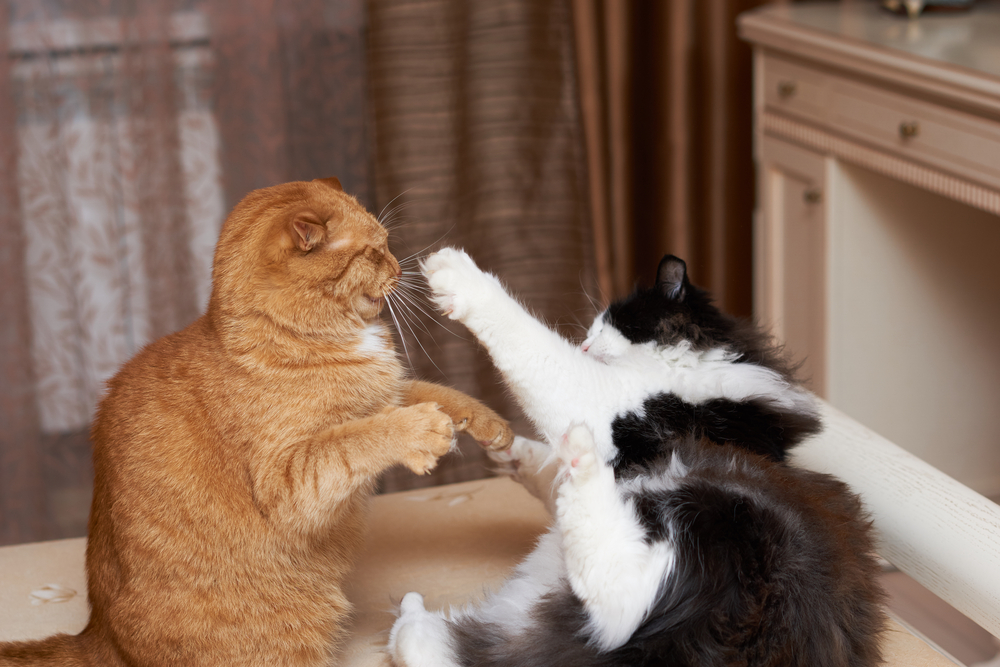
Why do cats fight?
Cats are territorial animals. They fight with other cats to protect their territory or to gain more territory. Our vets regularly see wounds as a result of cats fighting with each other, although cats are also occasionally bitten by dogs and rodents.
Be aware that even the friendliest of cats can get into fights, while pets who live together sometimes end up having aggressive altercations over food, toys or even their favourite place to lie.
If you suspect your cat has been badly injured in a cat fight seek urgent advice from your vet or, out of hours, your nearest Vets Now.
What are the most common cat fight injury symptoms?
Some cat fight injuries wounds are glaringly obvious while others may be hidden by fur. Small punctures, which can be just as dangerous as open wounds, are also often hard to spot.
While all cats are different, it’s likely those suffering from a bite wound will display one or more of the following signs:
- Lameness
- Crying or growling
- Reluctance to move
- Reluctance to be handled
- Pocket of pus on the skin forming an abscess
- Loss of appetite
- Lethargy

How do I stop cats fighting?
Stop cats fighting by calmly inserting a barrier, like large a piece of card, between them. Remember to Avoid panicking and making loud noises in an attempt to startle them into stopping as this may do more harm than good.
How do cats behave after fighting?
You may notice that your cat acting strangely after a fight. For example, if a cat has been badly wounded they may hide in silence. It’s likely they’ve inherited this behaviour from their wild ancestors as cats in the wild who are suffering from an injury will often try to hide it in an attempt to dupe predators into thinking they’re not vulnerable. Just bear in mind this may lead to a dangerous delay in treatment in domestic cats.
Injured cats also sometimes show more aggression than normal after fighting. For example, an injured cat will often bite or scratch defensively when approached. This can be dangerous for their owners and other pets as cats often carry dangerous bacteria such as bartonella henselae, which can cause a condition called cat scratch fever.
Are some cats more likely to fight than others?
While there are many reasons why a cat may fight, unneutered males are most likely to show aggression due to their territorial nature and inherent competition between male cats.
How to clean a cat fight wound
Bite wounds, especially small puncture wounds, are highly likely to become infected due to bacteria from within the cat’s mouth contaminating the wound. Over a few days, this bacteria will multiply in number and often result in an abscess forming.
Cellulitis (infection within the tissues), septic arthritis (infection in a joint), osteomyelitis (infection of bone) or pyothorax (infection within the chest cavity) are possible complications from cat bite wounds.
If your cat has been bitten:
- keep them calm and warm in a blanket, keeping the nose and mouth exposed
- be careful handling your cat as they may be very painful
- bathe any wounds with dilute salt water (one teaspoon of salt in a pint of cooled boiled water), try to bathe the wound twice per day for a couple of days to help reduce the likelihood of infection
- it can be difficult to spot small puncture wounds, so keep a close eye on your cat and if you see any signs of infection developing such as heat, swelling, pain, lethargy or fever then contact your vet
Will cat fight injuries heal on their own?
Unfortunately, cat fight injury wounds often end up septic. This can make cats quite ill, and if the wounds are left untreated, can pose a danger to their health.
My cat's been fighting, what will happen at the vets?
Your vet will ask you about your cat’s health, the onset of signs, and what happened prior to him arriving at the clinic.
During the examination, your vet will carefully observe how your cat breathes and will listen to his chest for evidence of a heart murmur or fluid in the lungs. Your cat’s gum colour will also be evaluated as this can indicate whether oxygen is being delivered to the organs effectively, or if it there is a low red blood cell count (anaemia).
What if my cat's struggling to breathe after a fight?
If your cat is having extreme difficulty breathing, the vet or vet nurse may take them through the back area of the clinic to enable them to give your cat oxygen.
Most examinations will involve blood tests to check for underlying disease conditions and x-rays or ultrasound to examine the lungs and heart. Treatment for breathing problems will depend on the diagnosis your vet makes. Most breathing problems require admittance into the hospital.

